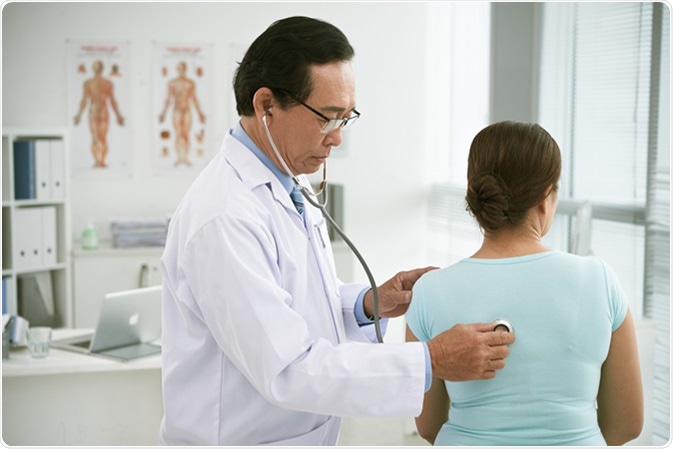Walking pneumonia is a respiratory infection that affects the lungs. It is a milder infection than pneumonia and is also known as community-acquired pneumonia, atypical pneumonia, and mycoplasma pneumonia. It is a contagious disease that requires long-term contact with the infected person for transmission of the illness.

Image Credit: Dragon Images / Shutterstock
What Causes Walking Pneumonia?
The inflammation of the lung tissue in pneumonia can have a bacterial or viral cause of origin. In the case of Walking Pneumonia, the cause is the mycoplasma pneumoniae bacterium. The symptoms of this form of pneumonia are marginally different from the symptoms of pneumonia caused by other bacteria or by viruses.
While Walking Pneumonia makes the person feel tired and low on energy, it does not cause very severe symptoms. The person can carry on basic tasks without much difficulty. Mycoplasma pneumoniae may also cause other upper respiratory infections such as bronchitis. Those may result in more severe symptoms and will require medical treatment.
Symptoms tend to appear two to three weeks after exposure to the bacteria. Walking Pneumonia is diagnosed by a chest x-ray recommended on the basis of typical symptoms. The health care provider will also ask for general health history while making the diagnosis. Extra blood tests may be required if the health care provider deems it necessary.
Minute Mayo Clinic Minute: Does your child have walking pneumonia?
Is Walking Pneumonia Contagious?
As it is caused by a bacterium, it is possible for the bacteria to spread through phlegm, sneeze droplets, and cough mucus. It is contagious and will easily spread between people who have regular contact. This means places where many people are found together for extended periods of time become possible transmission areas.
For example, school classrooms, military barracks, college dormitories, young people’s hostels, crowded workplaces are rife with infection possibilities. Those below forty years of age are more susceptible to Mycoplasma pneumoniae. This does not mean, however, that older people will not ever contract the disease.
Observed Symptoms of Walking Pneumonia
The symptoms most commonly associated with walking pneumonia include a low-grade fever, a sense of fatigue, a mild headache, and a general feeling of uneasiness. The person may also develop a skin rash and start with a dry cough. Some may develop an ear infection or may have to deal with inflamed sinuses and a sore throat.
Other symptoms may include shivering and body chills, shortness of breath while climbing stairs, pain in the chest region when breathing deeply, and a loss of appetite. Muscles may ache, and joints may be stiff. In rare cases, the patient may even suffer from loose motions. The symptoms will differ from person to person. Also, symptoms are typically much milder than in regular pneumonia.
Treating Walking Pneumonia
Walking Pneumonia is easily treated with antibiotics. Commonly prescribed antibiotics include azithromycin, clarithromycin, erythromycin, fluoroquinolones and tetracyclines. The fever can be controlled using medicines such as ibuprofen and naproxen. Most people will self-medicate even without knowing that they have Walking Pneumonia to control the fever.
Since cough medicines suppress the sputum, avoid having them without prescription. Ensure lots of fluid is drunk as it helps to free up the phlegm. Allow the body to rest as much as possible, and don’t try to finish household chores when you feel down and out of energy. The idea is to get as much rest as possible to recover quickly.
In many cases, patients with Walking Pneumonia may not be medically treated. As the symptoms are not too severe, the patient usually suffers through them until cured; however, the recovery will be much faster if the condition is diagnosed and medicines are prescribed. So if that cold and cough lasts longer than ten days, it is a good idea to get it checked out.
How to Prevent the Spread of Walking Pneumonia
As with most communicable diseases, it is best to isolate the patient as much as possible to avoid the disease's spread. Unlike most illnesses, in the case of Walking Pneumonia, the patient is usually unaware that they are infected with a serious illness.
However, if any symptoms are present, it is good to wash hands often and have other people around do the same. The patient should also avoid smoking and stay away from crowds. Ideally, people with weak immune systems should get the flu shot annually to avoid falling ill.
Those who have suffered from the infection once will develop a level of immunity to mycoplasma. However, this will not last a lifetime. The exact duration of immunity is unknown and can differ from person to person based on the state of their immune system. Secondary infections have been observed in people with weaker immune systems. They can often prove more dangerous than Walking Pneumonia.
References
Further Reading
Last Updated: Feb 16, 2021